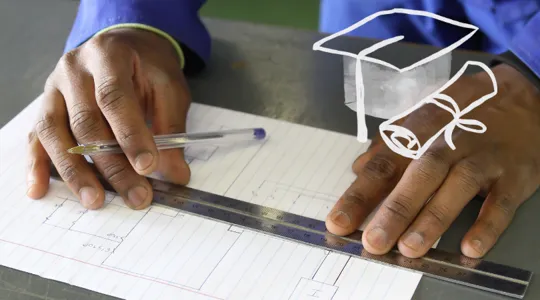- Quick Summary
- What are some examples of trade schools that pay you to attend?
- Do Trade Jobs Pay Well?
- 1. BMW STEP Program
- 2. Tesla START Program
- 3. Cummins Certification Training
- 4. Carpenters Trades
- 5. Elevator Installers and Repairers Apprentices
- 6. Plumbers School
- 7. IBEW 164 Telecommunications
- 8. Emergency Medical Technician (EMT)
- 9. Dental Assistant Program
- 10. Pharmacy Technician
- 11. Nursing
- Frequently Asked Questions
- Earn While You Learn at School
- Conclusion

- Quick Summary
- What are some examples of trade schools that pay you to attend?
- Do Trade Jobs Pay Well?
- 1. BMW STEP Program
- 2. Tesla START Program
- 3. Cummins Certification Training
- 4. Carpenters Trades
- 5. Elevator Installers and Repairers Apprentices
- 6. Plumbers School
- 7. IBEW 164 Telecommunications
- 8. Emergency Medical Technician (EMT)
- 9. Dental Assistant Program
- 10. Pharmacy Technician
- 11. Nursing
- Frequently Asked Questions
- Earn While You Learn at School
- Conclusion
You’ve graduated from high school; now what? You might want to further your education, but you have responsibilities that go beyond just being able to pay for tuition. Finding a trade school that will pay you to attend would go a long way to getting that needed education.
What are some examples of trade schools that pay you to attend?
- BMW STEP program
- Tesla START program
- Cummins Certification Training
- Carpenters Trade apprenticeship
- Elevator Installers and Repairers apprenticeship
- Plumbers School apprenticeship
- IBEW 164 Telecommunications apprenticeship
- EMT apprenticeship programs like Spartanburg Community College's EMT Academy
- Dental assistant apprenticeship programs like CHAS Health's
- Pharmacy technician apprenticeships at retailers like Walgreens and CVS
- Nursing apprenticeships at hospitals and technical schools
Do Trade Jobs Pay Well?
Most trade jobs offer solid take-home pay. They often have great benefits and retirement plans. One of the highest-paying trade jobs is an elevator mechanic.
They have a median salary of $97,860 per year. A trade education is usually low-cost compared to a four-year college associate degree.
You know you can earn a good living with a trade school education. But you don’t have to wait. Some trade schools will actually pay you to attend. They offer apprenticeships through private companies and unions.
Here’s what you need to know:
1. BMW STEP Program
Image source: bmwstep.com
The BMW STEP program trains students to work on BMWs. Students receive 90 percent hands-on learning in a live workshop environment.
While in the program, you will learn:
- Locating and analyzing repair instructions and wiring diagrams
- Technology and features
- Warranty philosophy and policy
- How to work safely in a workshop environment
- Safety data sheets (MSDS)
Apply in person or with a recruiter if they visit your high school. You must apply six months before the course date. Once you apply, a STEP recruiter will contact you.
There are some program requirements. They include:
- 3.0 GPA or better
- Minimum 95 percent attendance rate
- Clean driving record (BMW standards)
- Work portfolio
- Pre-employment background check
- Drug screening
Training centers are located in Georgia, California, and New Jersey.
Students are considered temporary employees of BMW and are paid $15 per hour while taking the course. After graduation, the average BMW mechanic in the U.S. earns $60,427.
2. Tesla START Program
Image source: YouTube.com
The Tesla START program allows you to become an electric vehicle (EV) mechanic. It is offered at six different schools across the U.S.
START is a 12-week course. Tesla provides this course instead of having a student spend weeks or months training on the job. This provides more in-depth knowledge and allows the student to start work immediately.
Schools that participate in the Tesla START program include:
- Rio Hondo College, Whittier, CA
- Evergreen Valley College, San Jose, CA
- Miami Dade College, Doral, FL
- Central Piedmont Community College, Huntersville, NC
- Suffolk County Community College, Selden, NY
- Shoreline Community College, Shoreline, WA
You will learn the ins and outs of EVs. This includes:
- EV skills
- Battery architecture
- Charging technology
- Tesla-specific repair procedures
There is no cost to be a part of the Tesla START program. Instead, Tesla pays you to attend the course. The stipend is $9.46 per hour. Eligible trade school graduates are placed at a Tesla Service Center.
The median annual salary of a typical Tesla Service Technician is around $50,000.
3. Cummins Certification Training
Cummins doesn’t repair vehicles; they manufacture engines. Their engines are used in a wide variety of vehicles.
Certification comes from completing a Cummins diesel school or a Cummins technician apprentice program.
Cummins engines can be found in various industries, including:
- Agriculture
- Defense
- Fire and emergency
- Drilling
- Heavy-duty truck
- Marine
- Mining
- Railroad
Cummins also has generators.
Cummins technician apprentice program pairs each student with a Cummins certified technician.
The Cummins Apprentice Program is available throughout the U.S. Currently, there are 50 apprentice openings.
Requirements for the Cummins Apprenticeship Program include:
- High school diploma or GED
- 2.8 GPA to meet college requirements
- Qualifying military veteran
However, based on your experience, a Cummins apprentice earns an average of $14 per hour. But you will have the opportunity to increase your pay as the apprenticeship proceeds.
4. Carpenters Trades
Image source: carpenterstraininginstitute.org
A carpenter constructs, repairs, and installs frameworks and structures using wood and other materials. They work both indoors and outdoors.
A carpenter apprenticeship lasts three to five years and requires a minimum of 4,800 work hours. You also must have 612 hours of instructional classes. You may take a state licensing exam and become a fully qualified carpenter upon completion.
During this time, you will learn how to read a blueprint and measure and cut wood.
Some requirements to enter an apprenticeship program include:
- High school diploma or GED
- Strong math skills
- Familiarity with power tools
- Experience in construction
- Physical strength and stamina
The year of the apprenticeship determines pay. For example:
- Year one: $33,436 to $46,363
- Year two: $45,600 to $63,200
- Year three: $51,666 to $71,646
- Year four: $$57,748 to $80,077
Wages vary according to region.
5. Elevator Installers and Repairers Apprentices
Elevator mechanics troubleshoot elevators and similar equipment. To learn this skill, you must first complete technical education and on-the-job training.
During an apprenticeship program, you’ll learn:
- Blueprint reading
- Electrical wiring and circuits
- Safety protocols
- Electrical theory
- Elevator equipment and machinery
An elevator apprenticeship lasts four to five years. Some states require a license to work on elevators. Check with your state to ensure you are following regulations.
Requirements to enter an apprenticeship program include:
- High school diploma or GED
- Knowledge of hydraulics or traction
- Mechanical skills
- Physical strength and stamina
- Problem-solving
- Critical thinking skills
Elevator apprentices are paid either per job or an hourly rate. For example, their hourly pay in the U.S. is around $30.
6. Plumbers School
Image source: explorethetrades.org
Plumbing apprenticeships usually last up to five years and these programs usually require a minimum of 2,000 hours of hands-on training.
Tasks you’ll learn during the apprenticeship include:
- Learning codes and regulations
- Reading blueprints
- OSHA safety
- Fixtures and drainage
You’ll work with other plumbers in training, but you’ll also observe experienced plumbers and receive feedback on your work.
To be a professional plumber, you’ll need to be licensed. Every state has different requirements, but the typical ones include:
- 2 to 5 years of experience
- Passing exams on plumbing trades and local codes
- A passing score of at least 70 percent to 75 percent, depending on the state
Plumber apprentices are paid while they learn. The average U.S. hourly wage for a plumber apprentice is $18 to $25.
7. IBEW 164 Telecommunications
As one of the first of its kind in the U.S., this is a four-year federally and state-registered telecommunications program.
Telecommunications training encompasses:
- IP telephony
- PBX telephone systems
- local area networks
- CATV/CCTV
- PC training
- Fiber optics – FOA certifications
- Grounding/bonding
- Aerial and buried cabling
The International Brotherhood of Electrical Workers (IBEW) only accepts 100 applicants per enrollment period. The acceptance is initially done on a lottery basis. If your name is selected, you receive an application.
Apprentices attend school full-time during the day. A staff of full-time professionals provides instruction. The program entails:
- Classroom lectures
- Labs
- On-the-job training
To achieve Journeyman status, five years must be completed with satisfactory performance.
Requirements for the program include:
- 18 or over
- Photo ID
- Social Security card
- Birth certificate
- High school transcript
- High school diploma - If submitting a GED, test score submissions are required.
- Ability to lift 75 pounds
Apprentices are paid around $21.06 per hour. This is roughly 22 percent higher than the national average.
8. Emergency Medical Technician (EMT)
Image source: uscmed.com
There are many trade school programs that offer apprenticeships to become emergency medical technicians (EMTs). Spartanburg Community College offers a paid apprenticeship program called EMT Academy.
The EMT Academy includes seven-week training programs and the opportunity to apply for a permanent EMT position.
EMTs are entry-level positions in prehospital emergency medicine. They work in clinics and hospitals and drive ambulances.
To apply to Spartanburg Community College EMT Academy, you must:
- Have a high school diploma or GED
- Be 18 years old before the NREMT Practical Exam date
- Be physically fit
- Complete ENG 111 or CASAS Reading and Comprehension score above post-secondary level
- Complete MAT 143 or CASAS Math score above the post-secondary level
- Current/valid state driver’s license
- Meet clinical field experience and field internship prerequisites and requirements
Although it is not specified what the program pays, it does have 100 percent job placement. The average EMT earns between $16.68 and $22.07 nationally.
9. Dental Assistant Program
Image source: georgebrown.ca
Although there are more throughout the country, we’ll focus on the CHAS Health dental assistant apprenticeship program.
CHAS Health is a federally qualified non-profit health center. It conducts a one-year (2,000-hour) dental assistant apprenticeship program. Once completed, you'll be able to work as a registered dental assistant in the states of Washinton and Idaho.
Work includes:
- Mandatory lab days
- Homework assignments
- Completing related coursework
During the program, the apprentice works hands-on in the dental clinic alongside a coach and team. They are able to practice clinical skills.
Requirements to participate in the CHAS Health apprentice program include:
- 18 years or older
- High school diploma or GED
- Ability to pass a Washington state background check
- Resume
- Personal statement (350 words or less)
- Life impact statement (100 words or less)
- Short answer response (100 words or less for each question)
- Minimum one letter of recommendation
The CHAS Health Dental Assistant Apprenticeship Program wage starts at $27.75 per hour. They also offer a $2,000 sign-on bonus.
10. Pharmacy Technician
Many pharmacies, like Walgreens and CVS, have apprenticeship programs. Apprenticeships prepare students for pharmacy technician careers and offer pharmacy support roles.
Some pharmacy jobs that you could be training for include:
- Retail pharmacy techs
- Long-term care pharmacy techs
- Mail, specialty, and PBM
- Home infusion pharmacy techs
Many pharmacies will pay trainees to complete the PTCB training and pass the Pharmacy Technician Certification Exam (PTCE).
Requirements for applying are:
- High school diploma or GED
- Social Security number
- Mailing address
- Full legal name
- Complete the fingerprinting process with an approved vendor
A pharmacy technician trainee cannot have a current/active PTCB or ExCPT certification. They also cannot have been previously registered with TSBP as a pharmacy technician or a pharmacy technician registration.
A pharmacy apprenticeship is a paid position. The average salary is $18.31 per hour or $35,168 annually.
11. Nursing
A nursing apprenticeship allows nursing students to work in healthcare while completing their practical nurse (PN) or registered nurse (RN) programs.
It allows them a hands-on opportunity.
Some of the tasks that a nursing apprentice will learn and be expected to do include:
- Installing IVs.
- Performing EKGs.
- Collecting specimens for testing.
- Transporting patients.
- Bathing and dressing patients.
- Recording the patient’s fluid intake and output.
Many hospitals and technical schools offer nursing students opportunities to participate in apprenticeship programs. This is partly due to the nursing shortage.
The average salary for a nursing apprentice in the U.S. is $45,806, with a range of $25,500 to $77,500. Most nursing apprentices earn between $17.31 and $24.04 per hour.
Frequently Asked Questions
Now that we’ve shown you some skilled trades jobs where you can be paid to learn, you might have a few more questions. Here are the most frequently asked questions.
1. Can you earn money while being trained for a job?
There are training programs that take several years to complete and be certified. While you are learning, you do hands-on work. And although you won’t be paid a full salary, you will typically make half of what you eventually will earn once fully trained.
2. Can you earn college credit in an apprenticeship program?
You can earn college credit in an apprenticeship program since technical schools, community colleges, universities, and technical training centers provide most programs.
3. What is the difference between an internship and an apprenticeship?
Internships are unstructured and emphasize entry-level work. Apprentices work closely with a mentor to improve their skills. They earn a wage as they advance. For example, an intern at a winery cleans up after a wine tasting. But an apprentice works under the mentorship of the winemaker and makes the wine.
Earn While You Learn at School
There are many trade schools and programs that will pay you to learn. The main reason is it takes years to learn the craft for which you’re training to do.
One of the best parts of working in the trades and going through an apprenticeship program is the lack of debt. You'll learn a trade without going into debt with student loans.
Look at your interests and see if there’s a program for you.
Conclusion
Trade schools that offer apprenticeship programs where you can get paid to learn are a fantastic option for those students seeking a hands-on, cost-effective education.
These programs provide valuable on-the-job training and the opportunity to earn a decent wage while gaining expertise in fields like automotive repair, electrical work, plumbing, and nursing. The lack of student debt is a major advantage, and the potential for high-paying careers upon completion makes these programs an attractive choice for many.
With a wide range of options available, there is likely a trade school that can provide the training and financial support you need to launch a successful career.






